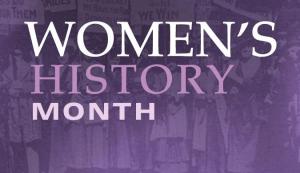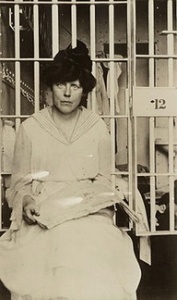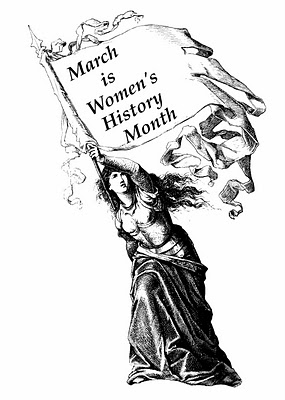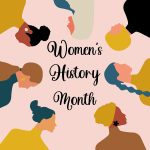Here’s to March as Women’s History Month – As a way to honor it, I invite you to write in one (or more) of your favorite women from history who did not have children. She can be someone who was childless by circumstance or not, or a woman who was childfree-someone who consciously chose not to have children in eras where that was a bold choice.
Even if you don’t know how she came to have no children (I find not knowing exactly how many came to have no children is fairly common, at least from reading the history books), if she is one of your favorites, write in about her….let’s focus on great women from history whose lives did not include motherhood.
But first…
…a nod to that there even is a Women’s History Month. How did it come to be? The idea started in 1981. From the Law Library of Congress’ guide to the legislative history of Women’s History Month:
“Women’s History Month had its origins as a national celebration in 1981 when Congress passed Pub. L. 97-28 which authorized and requested the President to proclaim the week beginning March 7, 1982 as ‘Women’s History Week.’ Throughout the next five years, Congress continued to pass joint resolutions designating a week in March as ‘Women’s History Week.’
In 1987 after being petitioned by the National Women’s History Project, Congress passed Pub. L. 100-9 which designated the month of March 1987 as ‘Women’s History Month.’ Between 1988 and 1994, Congress passed additional resolutions requesting and authorizing the President to proclaim March of each year as Women’s History Month.
Since 1995, Presidents Clinton, Bush and Obama have issued a series of annual proclamations designating the month of March as ‘Women’s History Month.'”
Want to see some great examples? Check out a smashing pinterest by Olivia Reading !
Briefly answer these questions for your pick:
1. Why is she one of your favorite women from history?
2. What about her life intrigues or interests you the most?
3. What about her or her life inspires you the most?
 I’ll start. Here is one one of my favorites.
I’ll start. Here is one one of my favorites.
Watching the recent documentary aired on PBS , “Makers: Women Who Make America” brought to mind amazing women in history–one such group was the incredibly bold suffragettes who fought for women’s right to vote. One of these brave women who had no children was Lucy Burns.
She is one of my favorites because of her dogged determination, such that she devoted most of her adult life to fighting for women’s equal voting rights. I am most interested in how her role in achieving the 19th amendment unfolded, and I find this point in her role in the process very inspiring:
“Burns was the first woman to speak before the Congressional delegates in 1914 when the Anthony amendment finally made it out of committee and into the House.While her speech was primarily to set the stage for Alice Paul, she also outlined the accomplishments of the Congressional Union. The fact that she was the first to speak at such a critical time for federal suffrage shows not only her courage in the face of opposition, but how well respected she was by her fellow leaders and suffragists. The speeches of Burns and Paul were incredibly important at that time in the movement because they showed politicians that women would unite as a voting bloc.”
Let’s hear from You!



My absolute favorite childfree female role model is Julia Child. I love that she had such a fantastic relationship with her husband and that for both of them, not being able to have children was no big deal. She says that very clearly in her book, but the movie Julia and I made it appear as if Julia Child and her husband had always desperately wanted children and were heartbroken at not being able to have them.
The fact is that once Julia and Paul Child accepted that they weren’t going to have kids, they got on with the business of being awesome. They lived in Paris for many years and had grand adventures, one of which (culinary training) turned out to make Julia a star and enabled her to bring about a revolution in American home cooking. They both were super-creative and accomplished so much in their time, and it’s clear that their life together was full of fun, laughter, and great love and deep respect for one another.
Even though my husband and I are childfree by choice rather than by circumstance, I like to think of us as very much following in Julia and Paul Child’s footsteps. I hope that when pass, people who knew us and people who observed us will say of us, “They were creative, passionate people together and apart, they had fun, they were in love, and they lived life to its absolute fullest.” That is how I think of Julia and Paul Child.
Dee, What a great response! I just love it. I enjoyed the movie about her (Streep was awesome) but I too, knew that it misrepresented how they responded to them not being able to have children. To have portrayed that is was no big deal and they got on with amazing lives would have been such a great role model for those who experience similar circumstances. Instead, it reinforces pronatalist messaging that not being able to have your own children is not a good thing, which today influences so many women/couples to do anything to have “their own.”
Thanks again for such a thoughtful comment on an great women from history and her partner! ~L
Maeve Bincy would be my first pick. Like Julia Child, she and her husband couldn’t have children. And yet what amazes me about Bincy, a novelist, is that she had this uncanny insight into the human condition. She wrote so poignantly about people’s relationships with each other, and that includes parents and their children. Maeve was really paying attention to the nuance of this human interaction, and it shows in the authenticity of her body of work. I’m sure there’s a little prejudice on my part — I too am a writer. Maeve Bincy encouraged me to write with authenticity as well — to really observe people and how they relate to each other, to delve below the surface. Love you, Maeve! You’re the best! 🙂
Lisa Marie, Love the nod to Maeve Bincy! For those who have not read her, what would you suggest as the book of hers to start? ~L
One that has inspired me is Queen Elisabeth I. Not only did she not have children, she also refused to get married. I saw a documentary once describing it as she learned from her half-sister Mary’s mistakes.
There was lots of complications in Queen Mary’s short reign relating to the fact that she was a female ruler, and not just a woman who is queen because she married a king. It seems to all boil down to who she could marry and genetics, beause she had to marry someone of royal status, her own class so to speak. But a man like that would not easily be ‘relegated’ to second place, particularly not behind a woman. And that seems to have created friction.
Queen Elisabeth watched and learned and when she took over, she decided that she would marry no one. At that time in history, not marrying also meant no children. I admire her because of her dedication and the fact that she never let herself be persuaded or pressurized in to marry and reproduce just to keep the family line going. After all, if there was anyone in history that had an excuse to procreate it would be her, because the Tudors died out when she died. But she focused her attention on the here and now, and to be a good ruler for her people. I think she rocks!!
Eli, I too think Queen E rocks – to not bow to pressure to marry and bear children at that time and in her position took real Guts!
Laura, I would recommend Bincy’s “Circle of Friends.” It was also made into a movie w/ Minnie Driver. Just my personal favorite. 🙂
I know this doesn’t completely count as childfree, but Rachel Carson. She never had biological children, but spent time caring for her nieces, along with caring for her mother until she passed. She adopted her orphaned nephew in 1957. She passed away in 1964 from breast cancer.
She was a brilliant scientist and researcher. she published Silent Spring and The Sea Around Us. The Sea Around Us became a New York Times bestseller, and was made into an Oscar winning documentary. Silent Spring was incredibly controversial as it broached the subject of pesticides and their effects on the environment. This book caused her to be vilified by others in the scientific community, along with politicians and chemical companies. They attempted to silence her and destroy her reputation. Silent Spring is credited with helping start the environmental movement in the US and helped reverse federal pesticide policies, leading to the creation of the EPA. She was also awarded the Presidential Medal of Freedom by President Carter.
Silent Spring is eloquent, bittersweet, and scary. I read it in my teens, and it has always stayed with me.
Nina, What an excellent choice! And awesome summary of one brazen woman — thanks so much. ~L
I’m no big fan of the Catholic church, but I’d add Mother Teresa to the list. She’s an embarrassing example to those who think childfree people are inherently selfish….